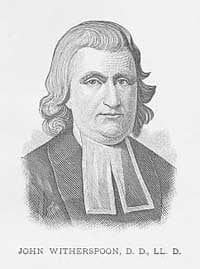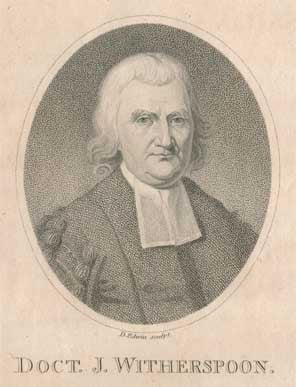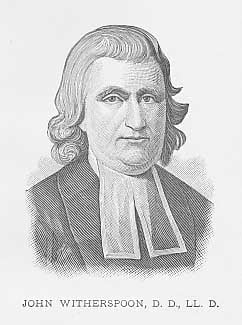 This Day in Presbyterian History:
This Day in Presbyterian History:
At last, He Had Arrived
You would have thought that he was a king making a royal entrance into his kingdom, so great was the rejoicing among God’s people to his arrival on the shores of the American colonies. And indeed, John Witherspoon was certainly the man whom God has chosen to lead the infant College of New Jersey in its next steps of Christian education.
The College had some dark providences associated with its leadership. In the twenty years of its existence, the five leaders who served as its president, had served a few years and then died. In fact, it was this mortality rate which cause Mrs. Elizabeth Witherspoon, John’s wife in Scotland, to want nothing to do with the College. And so there had been four appeals to come over and help them, but all four of them failed to move the Scotchman, but more particularly the Scotch woman to wish to cross over the Atlantic. Finally, with the aid of Benjamin Rush, who at that time was studying for a medical degree in Edinburgh, Mrs. Witherspoon was convinced that they should go. Despite the three-month crossing of the Atlantic Ocean in a sailing ship named the Peggy, with five children, and three hundred books for the College library might make anyone rethink the invitation, they did not. On August 7, 1768, the family arrived in Philadelphia, Pennsylvania.
Dr. David Calhoun, in his book “Princeton Seminary: Faith and Learning, 1812 – 1868,” describes John Witherspoon who stepped off the ship as being “a heavy-set man of forty-six, with brown hair, a strong face with large nose and ears, and blue eyes which looked out beneath bushy brows.”
Resting for five days in the city of Philadelphia, and who can blame them for that after such an ocean voyage, they traveled on to the town of Princeton, New Jersey in a horse and carriage. About a mile from the town, the entire student body of one hundred and twenty students, with the staff, met them and ushered them into the town and onto the campus. His family had use of a house, a garden, land for pasture, and firewood. There was an annual salary equal to 206 pounds sterling. That night, in every window of Nassau Hall, there was a candle which illuminated the building. The future Princeton University and Seminary were rejoicing over his safe arrival.
John Witherspoon was installed as the sixth president of the College of New Jersey on August 17, 1768. And, he was stand the test of time for decade, as well as through some of the most difficult days in the history of America. John Witherspoon would make his mark for God’s glory during all this time.
Also this day:
The Advisory Convention was held August 7-9, 1973, to set down final preparations for the First General Assembly of what was to become the Presbyterian Church in America, when that Assembly met December 4-7, 1973.
Words to live by: The Scot-Irish Presbyterians of the colonies knew what they had to have when they invited John Witherspoon. A strong advocate of the doctrines of the Westminster Standards, he had stood for the faith once delivered unto the saints in Scotland. He was an accomplished preacher, church leader, and an author. When a church leader has been bestowed Spirit-given abilities for service, or spiritual gifts, then much good for the saints is expected. When God’s glory is aimed at by that same leader, then much good for the kingdom of God is attained. Pray that God will sovereignly bestow His gifts upon the church at large, and your church in particular.
Witherspoon’s works have been largely overlooked and forgotten for some time now, or so it seems. Thankfully, however, his works have been reprinted in recent years. See the end of this post for a small taste of Dr. Witherspoon’s writing.
Through the Scriptures: Jeremiah 6 – 8
Through the Standards: Proof texts for the eighth commandment:
Deuteronomy 5:19
“And you shall not steal.” (ESV)
Ephesians 5:28
“Let the thief no longer steal, but rather let him labor, doing honest work with his own hands, so that he may have something to share with anyone in need.” (ESV)
1 Timothy 5:8
“But if anyone does not provide for his relatives, and especially for members of his household, he has denied the faith and is worse than an unbeliever.” (ESV)
Excerpt: The concluding paragraphs of Witherspoon’s Essay on Justification:
There is one observation which may satisfy us, that the preaching of the cross of Christ will most effectually promote real reformation. It is, that those preachers who (to say no more) approach nearest to making our own merit and obedience the ground of our acceptance with God, very seldom, if ever, give any alarm to the consciences of their hearers. Let them recommend ever so pure and high a standard of morals, they are heard without fear, and, if they preach elegantly, with pleasure, even by the most profligate. To such preachers, all vain worldly-minded people, usually attach themselves, where they have not cast off the very form of religion; but most part of serious Christians, together with professing hypocrites, who cannot easily be distinguished in this world, always follow preachers of another strain. It is easy to see the reason of this from what has been said above; there are none who set the strictness and obligations of the law, the holiness and justice of God, in so awful a light, as those who believe there is no shelter from the sanction of the law, and the wrath of an offended God, but in the blood of Christ. Perhaps, I am already ensnared and exposed to censure, by affirming, that there are among us preachers of different strains. But it is so certain a truth, that I cannot deny it; and so important, that I will not disguise it.
Upon the whole, as the present aspect of public affairs, as the state of the world, and character of the age, loudly call upon all of every station to exert themselves with diligence for the support and revival of truth and righteousness: I hope the ministers of the gospel will promote this end, by zealously laboring to bring men to the saving knowledge of Christ, “the way, and the truth, and the life—the foundation—the tried stone—the precious corner stone,” the strength and security of the building. To deny, explain away, or neglect to impart the truths of the everlasting gospel, is the way to leave the world in wickedness; but, by preaching them in purity, and with simplicity, which we have reason to think, will be accompanied with “the demonstration of the Spirit,” sinners are reconciled unto God, the power of sin is broken in them, the divine image is formed in them, and upon these truths their hopes of eternal life must rest and depend. Let us be ever ready to say with the apostle Paul, “God forbid that I should glory, save in the cross of our Lord Jesus Christ” (Gal. 6:14). And let us quicken our diligence, and animate our endeavors, by expressing, with the psalmist David, our faith in the perpetuity of his kingdom. “His name shall endure for ever: his name shall be continued as long as the sun; and men shall be blessed in him; all nations shall call him blessed. Blessed be the Lord God, the God of Israel, who only doth wonderous things. And blessed be his glorious name for ever; and let the whole earth be filled with his glory. Amen and Amen.” (Ps. 72:17-19).



